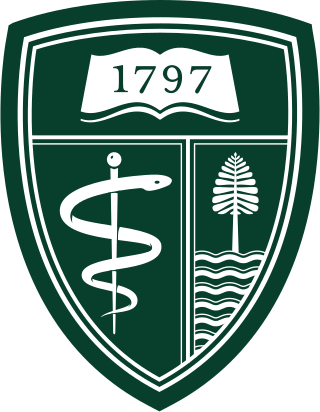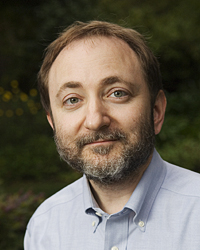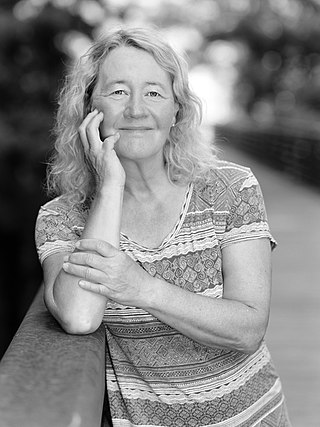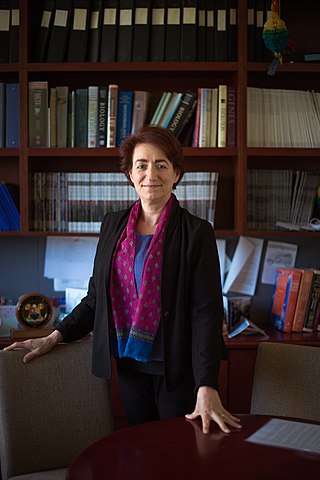Related Research Articles

The Geisel School of Medicine at Dartmouth is the graduate medical school of Dartmouth College in Hanover, New Hampshire. The fourth oldest medical school in the United States, it was founded in 1797 by New England physician Nathan Smith. It is one of the seven Ivy League medical schools.

Andrew Zachary Fire is an American biologist and professor of pathology and of genetics at the Stanford University School of Medicine. He was awarded the 2006 Nobel Prize in Physiology or Medicine, along with Craig C. Mello, for the discovery of RNA interference (RNAi). This research was conducted at the Carnegie Institution of Washington and published in 1998.

Carolyn Widney Greider is an American molecular biologist and Nobel laureate. She joined the University of California, Santa Cruz as a Distinguished Professor in the department of molecular, cell, and developmental biology in October 2020.
The Carnegie Institution of Washington, known also for public purposes as the Carnegie Institution for Science (CIS), is an organization in the United States established to fund and perform scientific research. The institution is headquartered in Washington, D.C. As of June 30, 2020, the Institution's endowment was valued at $926.9 million. In 2018 the expenses for scientific programs and administration were $96.6 million. Eric Isaacs is president of the institution.

Catherine Dulac is a French–American biologist. She is the Higgins Professor in Molecular and Cellular Biology at Harvard University, where she served as department chair from 2007 to 2013. She is also an investigator at the Howard Hughes Medical Institute. She was born in 1963 in France. She came to the United States for her postdoctoral study in 1991.
The School of Biological Sciences is a School within the Faculty Biology, Medicine and Health at The University of Manchester. Biology at University of Manchester and its precursor institutions has gone through a number of reorganizations, the latest of which was the change from a Faculty of Life Sciences to the current School.
Brigid L. M. Hogan FRS is a British developmental biologist noted for her contributions to mammalian development, stem cell research and transgenic technology and techniques. She is currently a Professor in the Department of Cell Biology at Duke University, Born in the UK, she became an American citizen in 2000.

Jane Maienschein is an American professor and director of the Center for Biology and Society at Arizona State University.
Philip William Ingham FRS, FMedSci, Hon. FRCP is a British geneticist, currently the Toh Kian Chui Distinguished Professor at the Lee Kong Chian School of Medicine, a partnership between Nanyang Technological University, Singapore and Imperial College, London. Previously, he was the inaugural Director of the Living Systems Institute at the University of Exeter, UK and prior to that was Vice Dean, Research at the Lee Kong Chian School of Medicine.

Lucy Shapiro is an American developmental biologist. She is a professor of Developmental Biology at the Stanford University School of Medicine. She is the Virginia and D.K. Ludwig Professor of Cancer Research and the director of the Beckman Center for Molecular and Genetic Medicine.
Charles K. Barlowe is a professor of biochemistry at the Geisel School of Medicine at Dartmouth, where he studies mechanisms of intracellular transport of proteins and lipids. His focus is on the molecular mechanisms of protein and lipid trafficking that underlie intracellular transport and seeks to understand how proteins catalyze distinct sub-reactions in membrane traffic. Currently, his focus is on the mechanisms of protein transport between the endoplasmic reticulum and the Golgi complex. He uses yeast and animal cell models to study this process using biochemistry, molecular genetics, and microscopy.

Don W. Cleveland is an American cancer biologist and neurobiologist.
Ruth Lehmann is a developmental and cell biologist. She is the Director of the Whitehead Institute for Biomedical Research. She previously was affiliated with the New York University School of Medicine, where she was the Director of the Skirball Institute of Biomolecular Medicine, the Laura and Isaac Perlmutter Professor of Cell Biology, and the Chair of the Department of Cell Biology. Her research focuses on germ cells and embryogenesis.
Hao Wu is a Chinese American biochemist and crystallographer and the Asa and Patricia Springer Professor of Structural Biology in the Department of Biological Chemistry and Molecular Pharmacology at Harvard Medical School. Her work focuses on molecular mechanisms of signal transduction in cell death and inflammation. She is the discoverer of signalosomes, which are large macromolecular complexes involved in cell death and in innate and adaptive immune pathways. She has established a new paradigm for signal transduction that involves higher-order protein assemblies. She has received the Pew Scholar Award, the Rita Allen Scholar Award, the Margaret Dayhoff Memorial Award, the NYC Mayor's Award for Excellence in Science and Technology, NIH MERIT and Pioneer Awards, and the Purdue University Distinguished Science Alumni Award. She was elected AAAS fellow in 2013 and to the National Academy of Sciences in 2015.

Hazel L. Sive is a South African-born biologist and educator. She is Dean of the College of Science, and Professor of Biology at Northeastern University. Sive is a research pioneer, award-winning educator and innovator in the higher education space who was elected as a Fellow of the American Association for the Advancement of Science in November 2021. Prior to June 2020, she was a Member of Whitehead Institute for Biomedical Research, Professor of Biology at Massachusetts Institute of Technology and Associate Member of the Broad Institute of MIT and Harvard. Sive studies development of the vertebrate embryo, and has made unique contributions to understanding how the face forms and how the brain develops its structure. Her lab also seeks to understand the origins of neurological and neurodevelopmental disorders, such as epilepsy, autism, Pitt–Hopkins syndrome and 16p11.2 deletion syndrome.
Steven Arthur Farber is an American scientist. He is a staff scientist at Carnegie Institution for Science.

Robyn Leigh Tanguay is an American researcher, academic and educator. She is a distinguished professor in the department of environmental and molecular toxicology at Oregon State University. She is the director of Superfund Research Program, the director of Pacific Northwest Center for Translational Environmental Health Research and the director of Sinnhuber Aquatic Research Laboratory at OSU.
Cecilia Moens is a Canadian developmental biologist. Moens is part of the faculty at the Fred Hutchinson Cancer Research Center in Seattle, Washington, where she researches the vertebrate brain using zebrafish as a model organism.
Judy Lieberman is a professor of pediatrics at Harvard Medical School and holds an endowed chair in cellular and molecular medicine at Boston Children's Hospital.
Tatjana Piotrowski is a German molecular geneticist who researches zebrafish as models of vertebrate development. She has worked at Stowers Institute for Medical Research since 2011 and is editor of the Annual Review of Genetics.
References
- 1 2 3 4 5 6 Cohen, Helene L. (2000). "Oral history interview with Marnie E. Halpern, 2000-Dec-04 – 2000-Dec-07 (full transcript downloadable)". Science History Institute . Center for Oral History.
- ↑ "Marnie E Halpern, PHD – Faculty Expertise Database – Geisel School of Medicine at Dartmouth" . Retrieved 2021-09-21.
- 1 2 "Marnie E. Halpern, Ph.D." The Pew Charitable Trusts. Retrieved 12 October 2021.
- ↑ Zambon, Kat (24 November 2014). "New AAAS Fellows Recognized for Their Contributions to Advancing Science". American Association for the Advancement of Science. Retrieved 13 October 2021.
- ↑ "Marnie Halpern". Department of Embryology, Carnegie Institution for Science. Retrieved 2021-09-21.
- ↑ Eisen, Judith S (December 1996). "Zebrafish Make a Big Splash". Cell. 87 (6): 969–977. doi: 10.1016/s0092-8674(00)81792-4 . ISSN 0092-8674. PMID 8978602. S2CID 17807157 . Retrieved 13 October 2021.
- ↑ Hertel, Derik (11 July 2019). "Marnie Halpern Named Chair of the Dept. of Molecular and Systems Biology". News. Geisel School of Medicine, Dartmouth College. Retrieved 12 October 2021.
- ↑ Dean, Timothy (22 Jul 2021). "Marnie Halpern Named the Andrew Thomson, Jr., MD 1946 Professor". News. Geisel School of Medicine, Dartmouth College. Retrieved 12 October 2021.